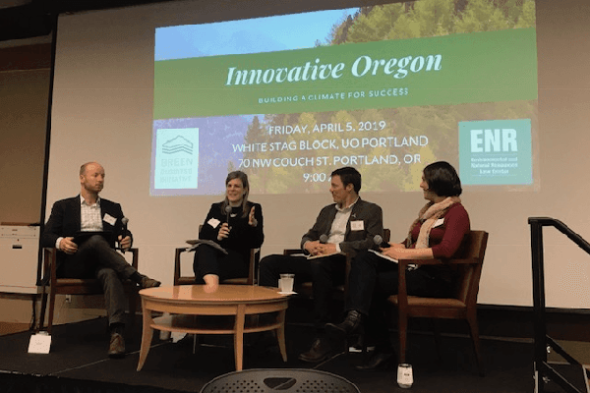Everything in Moderation: A Report from the 2019 Green Business Initiative Symposium
Posted on April 29, 2019 by Mike Goetz
Tags, Energy, Conference & Events

Earlier this month, I had the distinct pleasure of moderating a panel at the 2019 Green Business Initiative Symposium. Jointly presented by the University of Oregon School of Law’s Environmental and Natural Resources Law Center and the Green Business Initiative Student Association, the symposium has become a valued venue to discuss issues pertinent to Oregon’s ever-changing energy sector and beyond. This year’s symposium was no different, and its agenda covered a wide range of salient topics from water resource protection to renewable energy and transportation electrification.
Apart from being fortunate enough to be asked to moderate a panel at this symposium, I was honored to take the stage alongside a few incredibly bright energy professional colleagues. Joining me on the “Renewable Energy Business Potential” panel were Rikki Seguin, Policy Director at Renewable Northwest, Josh Halley, Renewable Power Project Manager at Portland General Electric (PGE), and Angela Crowley-Koch, Executive Director of the Oregon Solar Energy Industries Association (OSEIA). I work with all three in varying capacities in Oregon’s interconnected energy community, and our frank discussion about the history and future of renewable energy in our fair state was a pleasure.
As moderator, I first gave a brief history of renewable energy in the utility sector, covering the changing economic paradigm that has made renewables more and more cost effective, the proliferation of regional energy markets that decrease the likelihood of renewable curtailment, and intersecting state and regional policies such as Oregon’s Renewable Portfolio Standard (RPS). Then the panelists and I discussed a wide range of topics, beginning with each panelist painting an optimistic picture of how renewable energy will continue to expand in Oregon, from small-scale community and rooftop solar projects, to large utility-scale wind and solar investments.
As Oregon’s RPS for PGE and Pacific Power continues to ramp up to 50 percent renewable energy by 2040, these utilities are investigating different compliance options including both purchasing renewable energy credits (RECs) and physically building new renewable energy generation projects. We also discussed the implications of Oregon’s anticipated cap and invest program, now before the legislature as HB 2020. Although this bill won’t immediately drive new renewable energy projects, it will lead to increased electrification in other carbon-intensive sectors of the economy such as transportation and construction. Due to the aforementioned economics and RPS, however, much of this new load will be met with new renewable energy. Add a dash of legislatively mandated community solar, and intriguing new business ideas like PGE’s demand response testbed, and it is truly an exciting time to be working in the renewable energy field.
I was able to stay for the day’s final panel as well, which focused on reducing transportation emissions in Oregon. As the nation’s largest source of carbon emissions, the transportation sector is squarely within the crosshairs of environmental advocates searching for ways to decarbonize our economy. As providers of fuel for electric vehicles, the utilities will play an integral role in this process moving forward. The exact nature of their role may change, however, since CUB believes Oregon’s regulatory approach to electric vehicle investments must be improved to continue to accelerate transportation electrification.
All in all, it was a wonderful conference that featured experts presenting on real-time, pertinent issues in our state. I am already looking forward to next year’s conference.
To keep up with CUB, like us on Facebook and follow us on Twitter!




04/29/19 | 0 Comments | Everything in Moderation: A Report from the 2019 Green Business Initiative Symposium